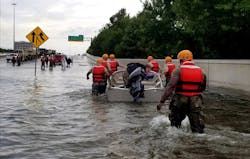Experts Warn of Hurricane Harvey Drinking Water Health Risks
Rescue efforts continued as Tropical Storm Harvey battered southeast Texas and southwest Lousiana. Health officials are warning residents of the health dangers they could face as floodwaters rise and drinking water supplies are compromised in the wake of the hurricane-turned-tropical storm.
Floodwaters could carry pathogens such as E. coli, Shigella and Legionella, Mayo Clinic infectious disease physician and researcher Pritish Tosh warned Newsweek. The Texas Department of State Health Services also warned of the risk of tetanus, which could enter the body through open wounds that come in contact with floodwater.
"Our best advice is always to avoid floodwater as much as you can," Chris Van Deusen, a spokesman for the Texas Department of State Health Services, told NPR. "Of course, people have had to be in the water—they haven't had a choice."
The state is sending a supply a tetanus vaccines to the affected areas, the NPR report noted.
Access to safe drinking water also is a major concern in the wake of the storm. Officials have warned residents not to drink tap water, a standard warning in the wake of a hurricane. According to a Newsweek report, public drinking water supplies in the Houston area have been compromised as floodwaters have inundated drinking water reservoirs, compounding the public health concerns.
Those who use private drinking water wells also are at risk. Dr. Phil Huang, medical director and health authority for Austin Public Health, warned well water users to boil water before drinking or to use bottled water instead.
Many companies and organizations have begun donating bottled water to Harvey relief efforts, including Anheuser-Busch, which halted beer production this week to instead can drinking water for storm victims.
